Related Research Articles
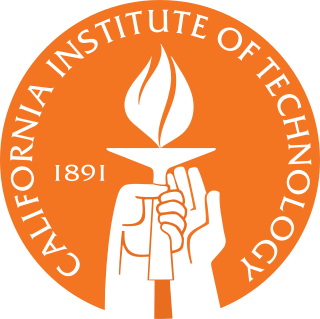
The California Institute of Technology (branded as Caltech) is a private research university in Pasadena, California. The university is responsible for many modern scientific advances and is among a small group of institutes of technology in the United States that are devoted to the instruction of pure and applied sciences.
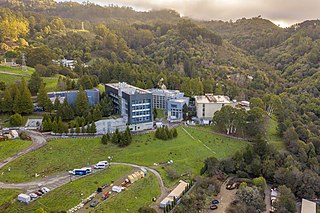
Lawrence Berkeley National Laboratory (LBNL) is a federally funded research and development center in the hills of Berkeley, California, United States. Established in 1931 by the University of California (UC), the laboratory is sponsored by the United States Department of Energy and administered by the UC system. Ernest Lawrence, who won the Nobel prize for inventing the cyclotron, founded the lab and served as its director until his death in 1958. Located in the Berkeley Hills, the lab overlooks the campus of the University of California, Berkeley.

Burton Richter was an American physicist. He led the Stanford Linear Accelerator Center (SLAC) team which co-discovered the J/ψ meson in 1974, alongside the Brookhaven National Laboratory (BNL) team led by Samuel Ting for which they won Nobel Prize for Physics in 1976. This discovery was part of the November Revolution of particle physics. He was the SLAC director from 1984 to 1999.

David Jonathan Gross is an American theoretical physicist and string theorist. Along with Frank Wilczek and David Politzer, he was awarded the 2004 Nobel Prize in Physics for their discovery of asymptotic freedom. Gross is the Chancellor's Chair Professor of Theoretical Physics at the Kavli Institute for Theoretical Physics (KITP) of the University of California, Santa Barbara (UCSB), and was formerly the KITP director and holder of their Frederick W. Gluck Chair in Theoretical Physics. He is also a faculty member in the UCSB Physics Department and is affiliated with the Institute for Quantum Studies at Chapman University in California. He is a foreign member of the Chinese Academy of Sciences.
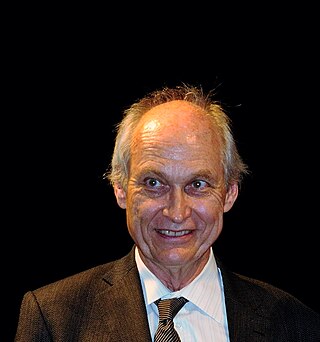
Michael S. Turner is an American theoretical cosmologist who coined the term dark energy in 1998. He is the Rauner Distinguished Service Professor Emeritus of Physics at the University of Chicago, having previously served as the Bruce V. & Diana M. Rauner Distinguished Service Professor, and as the assistant director for Mathematical and Physical Sciences for the US National Science Foundation.

Wolfgang Kurt Hermann "Pief" Panofsky, was a German-American physicist who won many awards including the National Medal of Science.

Sidney David Drell was an American theoretical physicist and arms control expert.

The President's Council of Advisors on Science and Technology (PCAST) is a council, chartered in each administration with a broad mandate to advise the president of the United States on science and technology. The current PCAST was established by Executive Order 13226 on September 30, 2001, by George W. Bush, was re-chartered by Barack Obama's April 21, 2010, Executive Order 13539, by Donald Trump's October 22, 2019, Executive Order 13895, and by Joe Biden's February 1, 2021, Executive Order 14007.

Steven Chu is an American physicist and former government official. He is a Nobel laureate and was the 12th U.S. secretary of energy. He is currently the William R. Kenan Jr. Professor of Physics and Professor of Molecular and Cellular Physiology at Stanford University. He is known for his research at the University of California, Berkeley, and his research at Bell Laboratories and Stanford University regarding the cooling and trapping of atoms with laser light, for which he shared the 1997 Nobel Prize in Physics with Claude Cohen-Tannoudji and William Daniel Phillips.
David Pines was a US physicist recognized for his work in quantum many-body systems in condensed matter and nuclear physics. With his advisor David Bohm, he contributed to the understanding of electron interactions in metals. Bohm and Pines introduced the plasmon, the quantum of electron density oscillations in metals. They pioneered the use of the random phase approximation. His work with John Bardeen on electron-phonon interactions led to the development of the BCS theory of superconductivity. Pines extended BCS theory to nuclear physics to explain stability of isotopes with even and odd numbers of nucleons. He also used the theory of superfluidity to explain the glitches in neutron stars.
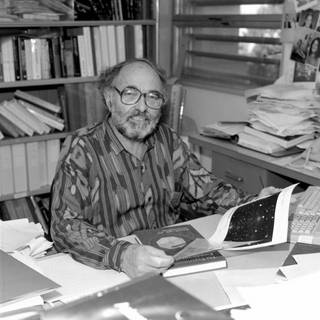
Gerson Goldhaber was a German-born American particle physicist and astrophysicist. He was one of the discoverers of the J/ψ meson which confirmed the existence of the charm quark. He worked at Lawrence Berkeley National Laboratory with the Supernova Cosmology Project, and was a professor of physics at the University of California, Berkeley as well as a professor at Berkeley's graduate school in astrophysics.
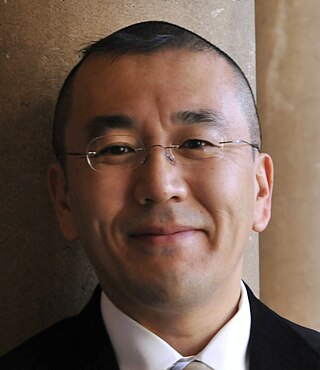
Hirosi Ooguri is a theoretical physicist working on quantum field theory, quantum gravity, superstring theory, and their interfaces with mathematics. He is Fred Kavli Professor of Theoretical Physics and Mathematics and the Founding Director of the Walter Burke Institute for Theoretical Physics at California Institute of Technology. He is also the director of the Kavli Institute for the Physics and Mathematics at the University of Tokyo and is the chair of the board of trustees of the Aspen Center for Physics in Colorado.

Anthony Michael Johnson is an American experimental physicist, a professor of physics, and a professor of computer science and electrical engineering at the University of Maryland, Baltimore County (UMBC). He is the director of the Center for Advanced Studies in Photonics Research (CASPR), also situated on campus at UMBC. Since his election to the 2002 term as president of the Optical Society, formerly the Optical Society of America, Johnson has the distinction of being the first and only African-American president to date. Johnson's research interests include the ultrafast photophysics and nonlinear optical properties of bulk, nanostructured, and quantum well semiconductor structures, ultrashort pulse propagation in fibers and high-speed lightwave systems. His research has helped to better understand processes that occur in ultrafast time frames of 1 quadrillionth of a second. Ultrashort pulses of light have been used to address technical and logistical challenges in medicine, telecommunications, homeland security, and have many other applications that enhance contemporary life.

Ernest Jeffrey Moniz, GCIH is an American nuclear physicist and former government official. From May 2013 to January 2017, he served as the 13th United States secretary of energy in the Obama administration. Prior to this, Moniz served as associate director for science in the Office of Science and Technology Policy in the Executive Office of the President of the United States from 1995 to 1997 and undersecretary of energy from 1997 to 2001 during the Clinton administration. He is currently the co-chair and CEO of the Nuclear Threat Initiative (NTI), as well as president and CEO of the Energy Futures Initiative (EFI), a nonprofit organization working on climate and energy technology issues, which he co-founded in 2017.
Bryan Ronald Webber, FRS, FInstP is a British physicist and academic. He was a Fellow of Emmanuel College, Cambridge from 1973 to 2010, and Professor of Theoretical Physics at the University of Cambridge from 1999 to 2010. He has been awarded the Dirac Medal by the Institute of Physics, the Sakurai Prize by the American Physical Society and the High Energy and Particle Physics Prize by the European Physical Society.

Charles Vernon (Chuck) Shank is an American physicist, best known as the director of the Lawrence Berkeley National Laboratory from 1989 to 2004.
Robert W. Conn was president and chief executive officer of The Kavli Foundation from 2009 to 2020, a U.S. based foundation dedicated to the advancement of basic science research and public interest in science. A physicist and engineer, Conn was also the board chair of the Science Philanthropy Alliance, an organization that aims to increase private support for basic science research, and dean emeritus of the Jacobs School of Engineering at the University of California, San Diego. In the 1970s and 1980s, Conn participated in some of the earliest studies of fusion energy as a potential source of electricity, and he served on numerous federal panels, committees, and boards advising the government on the subject. In the early 1970s, he co-founded the Fusion Technology Institute at the University of Wisconsin-Madison (UW), and in the mid-1980s he led the formation of the Institute of Plasma and Fusion Research at the University of California, Los Angeles (UCLA). As a university administrator in the 1990s and early 2000s, Conn served as dean of the school of engineering at UC San Diego as it established several engineering institutes and programs, including the California Institute for Telecommunications and Information Technology, known as Calit2, the Center for Wireless Communications, and the Whitaker Center for Biomedical Engineering. While at UC San Diego he also led the effort to establish an endowment for the school of engineering, which began with major gifts from Irwin and Joan Jacobs. Irwin M. Jacobs is the co-founder and founding CEO of Qualcomm. While Conn was dean, the engineering school was renamed in 1998 the Irwin and Joan Jacobs School of Engineering at UC San Diego. Conn's experience in the private sector includes co-founding in 1986 Plasma & Materials Technologies, Inc. (PMT), and serving as managing director of Enterprise Partners Venture Capital (EPVC) from 2002 to 2008. Over the years he has served on numerous private and public company corporate boards. Conn joined The Kavli Foundation in 2009. He helped establish the Science Philanthropy Alliance in 2012.
Risa H. Wechsler is an American cosmological physicist, Professor of Physics at Stanford University, and Professor of Particle Physics and Astrophysics at SLAC National Accelerator Laboratory. She is the director of the Kavli Institute for Particle Astrophysics and Cosmology.
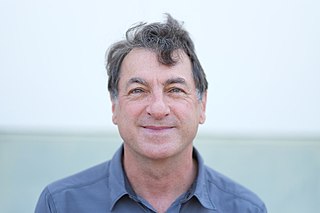
Mark John Bowick is a theoretical physicist in condensed matter theory and high energy physics. He is the deputy director of the Kavli Institute for Theoretical Physics at the University of California, Santa Barbara, and a Visiting Distinguished Professor of Physics in UCSB's Physics Department.
David A. Hammer is the J. Carlton Ward, Jr. Professor of Nuclear Energy Engineering, in the Cornell University College of Engineering. In 2004, Hammer received the Institute of Electrical and Electronics Engineers Plasma Science and Applications Committee Award, as well as the Distinguished Career Award from Fusion Power Associates in 2018.
References
- ↑ "David B. Goldstein".
- ↑ "Board of Directors | IMT". 16 April 2018.
- ↑ "David Goldstein". New Buildings Institute. Retrieved 2021-08-11.